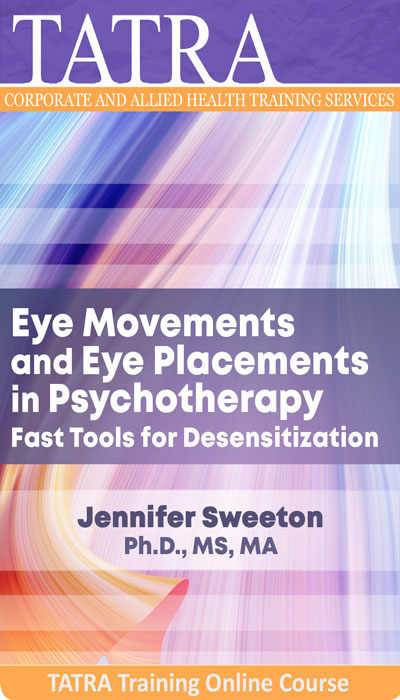08 Apr Eye Movements and Eye Placements in Psychotherapy – Fast Tools for Desensitization

- Eye Movements and eye placements, EMDR and Brainspotting strategies combined
- Techniques to implement right away!
- Learn these strategies and BOOST your treatment success rates
Several contemporary and classic psychotherapy modalities utilize eye movements and eye placements to help clients desensitize to, and process, distressing memories and thoughts. These techniques, which are often straightforward and easy to implement, are nonetheless underutilized by therapists, as few trainings teach these strategies in isolation.
Watch this online course presented by Dr Jennifer Sweeton, internationally known neuroscientist, clinical and forensic psychologist, and author, and learn several new and practical eye-based desensitization and processing skills that can immediately be integrated with almost any therapy approach!
This is a comprehensive course which stands on its own and can be taken even if you have not done any other courses on EMDR or Memory Reconsolidation with Dr Sweeton before. However, if you have done any of these courses in the past then you will still benefit as you will learn new techniques that will prove very useful in your practice. Dr Sweeton will teach you how you can use these techniques in an informal and casual settings so that you fast forward client’s recovery.
You will learn how to utilize two limbic areas of the brain involved in desensitization and you will become super fluent in implementing eye placement techniques that can facilitate desensitization and processing of distressing material.


This training will provide participants clinical knowledge and tools to:
a). Name and practice at least two eye placement techniques that can facilitate desensitization and processing of distressing material.
b). Name and practice at least two eye movement techniques that can facilitate desensitization and processing of distressing material.
c). Describe two limbic areas of the brain involved in desensitization.
Target Audience:
The target audience for this event includes psychologists, social workers, counselors, MFT’s, and other clinical mental health professionals.


This online workshop will give you instant access to 3 sessions of video content, accessible via streaming on our website, as well as downloads for supplemental materials. You can view the course content in your own time, there is no time limit on access.
The duration of this workshop is 3 learning hours.
Please click the green ‘Mark Complete’ button on each module as you progress. A certificate of completion will be generated upon finishing the course and completing a short assessment quiz. If the certificate is not showing, please confirm you have marked all sections as ‘Complete’. Please consult your professional organisation/association to confirm whether you are able to claim any CPD points/hours for this online workshop.



 Dr. Jennifer Sweeton is a clinical psychologist, best-selling author, and internationally-recognized expert on anxiety and trauma, and the neuroscience of mental health. She completed her doctoral training at the Stanford University School of Medicine, the Pacific Graduate School of Psychology (now Palo Alto University), and the National Center for PTSD. Additionally, she holds a master’s degree in affective neuroscience from Stanford University, and studied behavioral genetics at Harvard University.
Dr. Jennifer Sweeton is a clinical psychologist, best-selling author, and internationally-recognized expert on anxiety and trauma, and the neuroscience of mental health. She completed her doctoral training at the Stanford University School of Medicine, the Pacific Graduate School of Psychology (now Palo Alto University), and the National Center for PTSD. Additionally, she holds a master’s degree in affective neuroscience from Stanford University, and studied behavioral genetics at Harvard University.